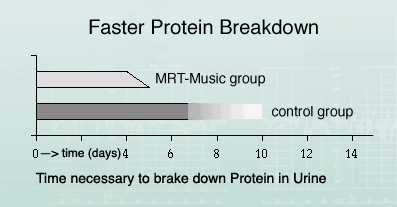Medical Resonance Therapy Music®
Group
For 7-10 days 13 women listened to the Medical Resonance Therapy Music® in the morning and after lunch and had no other therapy during these days.
Through the treatment with the Medical Resonance Therapy Music® the protein content in the urine was broken down within 4-5 days.
Control GroupFor 7-10 days 13 women listened to the Medical Resonance Therapy Music® in the morning and after lunch and had no other therapy during these days.
Through the treatment with the Medical Resonance Therapy Music® the protein content in the urine was broken down within 4-5 days.
14 women in this group received sedative and hypotensive drugs as well as a phytotherapeutic treatment.
Through the medical drug treatment the protein content in the urine was also effectively broken down, but it took much longer as in the MRT-group.
By a computer problem the exact data got lost.
Investigators:
Prof. Dr. med. G. Gerassimowitsch
Prof. Dr. med. Walentina Sidorenko
Dr. med. Swetlana Scheleg
